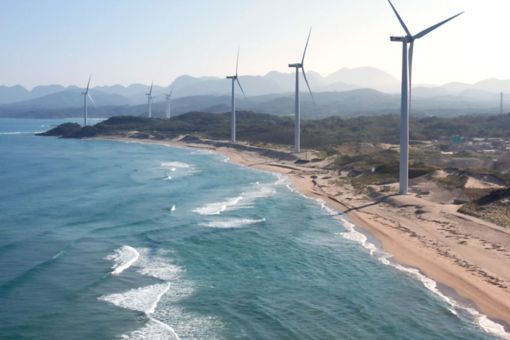Against a backdrop of ongoing geopolitical tensions, the rapid rise in generative AI and global economic uncertainty, energy, natural resources and chemicals (ENRC) CEOs are expressing high levels of confidence in growth prospects for their companies and the industry as a whole — and a new level of focus on improving the customer experience and executing ESG initiatives.
As part of the 2023 CEO Outlook, KPMG International surveyed 127 global CEOs in power and utilities, oil and gas, renewable energy, mining, and chemicals, gathering their insights and perspectives into the business and economic landscapes over the next three years.
Keep reading for their thoughts on what is in store for energy.

Based on the survey, global ENRC CEOs’ confidence in their own company’s growth prospects increased substantially in the past year to 87 percent, a jump of six percentage points from 2022. Their confidence level remains high in comparison to CEOs globally, who reported a three-year confidence low of 77 percent. Even as capital reallocation goes toward new, lower-carbon energies, CEOs in the industry believe their current business and customers are not going away anytime soon.
ENRC CEOs also report similar levels of confidence in the industry as a whole (83 percent), a two percent increase from 2022. This increased confidence could be due to gradual economic recovery and the sector’s rising significance in driving the energy transition across the globe.
Confidence in the global economy also surpasses levels from earlier in the pandemic. Three in four ENRC CEOs (75 percent) express overall confidence in the economy for the next three years, compared to 71 percent last year.
This is accompanied by a significant shift in what ENRC CEOs say are their operational priorities for achieving growth. For 12 percent, improving the customer experience is a top priority — up from zero percent in 2022. Advancing digitization and executing ESG initiatives are priorities for 23 and 17 percent of CEOs respectively.
Despite their optimism, ENRC CEOs are concerned about how geopolitical and political uncertainties (19 percent), operational issues (17 percent) and regulatory concerns (16 percent) may risk the growth of their businesses, highlighting the need for proactive strategies to address these matters.
CEOs recognize demonstrating personal integrity is key to building trust as they navigate and respond to these challenges. The majority (72 percent) say they are prepared to divest a profitable part of their business if it was damaging their reputation. As geopolitics rise on boardroom agendas, 58 percent of ENRC CEOs say they would take a public stance on a politically or socially contentious issue, despite board concerns. However, 76 percent also say they would publicly fall in line with their organization’s stance, even on an issue that conflicts with their personal beliefs.
The importance of building and sustaining public trust shows no sign of going away. The sooner ENRC CEOs and organizations recognize this — and that consistently working to build public trust is in their best interest — the better off they may be.

Artificial intelligence (AI) is transforming nearly every field of human endeavor and is embedded in more and more aspects of everyday life, businesses, and society. As tools have gained prominence, global ENRC CEOs recognize generative AI’s seemingly limitless potential and are starting to invest in and explore how their organizations can best use the technology.
Nearly two-thirds (64 percent) agree investing in generative AI is a top priority, with 48 percent expecting to see a return on their investment in three to five years. And CEOs are making sure the ENRC workforce is equipped to handle the transition to both AI and clean energy, with 52 percent focused on investing in upskilling their people (a seven percent increase from 2022) as opposed to prioritizing investment in new technology.
This broad enthusiasm for implementing AI and other emerging technologies is reflected in the recent KPMG global tech report, where 38 percent of executives said they have leadership buy-in for emerging tech — an increase of 28 percentage points from 2022. However, 55 percent of organizations also said progress toward automation has been delayed because of concerns about how AI systems make decisions. Similarly, 60 percent of ENRC CEOs agree that implementing generative AI can result in ethical challenges such as plagiarism, data protection, bias and lack of transparency. As AI scrutiny and regulation increases, organizations can look to create policies and practices they can articulate and apply with confidence.
ENRC CEOs are also grappling with how AI has heightened cyber security risks. While AI may help detect cyber attacks, 82 percent believe it could provide new attack strategies for adversaries. Even with all the attention placed on cyber security in the past few years, only 46 percent of CEOs say they are prepared for a cyber attack.
CEOs would be well advised to try to ensure their organizations adopt responsible, robust AI frameworks and focus on safeguarding and governance.

This year’s challenging global landscape underscores the pressures CEOs feel to make decisions on a variety of critical issues.
Notably, most global ENRC CEOs are steadfast in supporting pre-pandemic ways of working, with 73 percent anticipating a full return to office in three years — up eight percent from last year. Additionally, 94 percent say they are likely to reward employees who come into the office with favorable assignments, raises or promotions.
This sentiment underscores the persistence of traditional thinking in ENRC and comes against a backdrop of the debate surrounding hybrid working, which has had a largely positive impact on productivity over the past three years.
As organizations continue to roll out their return-to-office plans, leaders should take a long-term view that embraces the employee value proposition and keeps employees’ needs in mind to ensure they are nurtured and supported.
In fact, CEOs say they are focused on creating an inclusive environment for employees — one that values diversity and fosters a sense of belonging.
While ENRC CEOs are generally aligned on the importance of inclusion, diversity and equity (IDE), there continues to be concern about the pace of progress. More than half (60 percent) believe progress on inclusion and diversity has moved too slowly in the business world and a strong majority (72 percent) say that scrutiny of organizations' diversity performance will keep increasing over the next three years.

Global ENRC CEOs increasingly recognize ESG as an indispensable part of their corporate strategy that helps ensure their business is resilient and can deliver long-term growth. And with energy use accounting for almost three-quarters of global emissions,[1][SL1] CEOs are sensitive to taking meaningful action on all aspects of ESG, while balancing energy security and affordability.
Seventy-eight percent of ENRC CEOs say they have fully embedded ESG into their business to create value. Significantly, in an industry that has not always put emphasis on the customer, 22 percent believe ESG will have the greatest impact on their customer relationships over the next three years. They are prioritizing ESG investments to foster these relationships, as failing to meet ESG expectations can lead to higher financing costs and competitive disadvantages. And, more than one-third (37 percent) are prioritizing ESG spend on environmental challenges such as achieving net zero.
In the immediate term, 30 percent recognize the challenge of getting to net zero is hampered by the complexity of decarbonizing supply chains — brought on by geopolitical uncertainties, the high cost of alternatives and increasing regulations. In the longer term, Scope 3 emissions across the value chain will prove challenging for energy CEOs and organizations to tackle.
ENRC CEOs that stay ahead of the decarbonization curve will ultimately benefit from being proactive. Organizations are under pressure to decarbonize faster, and this pressure is only likely to continue to grow. Instead of continuing to kick the can down the road, readying yourself and your organization sooner can only help strengthen the business’ resilience.
Exploring opportunities for growth:
Technology
Embrace generative AI in a way that is ethical, makes the most sense for your business and keeps the needs of your employees and clients at the forefront.
Stay up to date with cyber-attack strategies so you and your employees do not expose the business to risk.
Create a safe space for your people to experiment with innovative ideas and strategies.
Talent
Take a long-term view when it comes to employees’ desire for hybrid or remote working to ensure that talent is nurtured and supported.
Set the tone at the top. Senior leadership should make IDE a stated priority, set real targets, fund initiatives and appoint management to lead programs with clear accountability.
ESG
Position ESG as a driver for value creation when it comes to business growth, rather than as a risk to be managed. New avenues open when ESG is considered in the growth conversation.
Stay attuned to shifting ESG regulations to help maintain your business’s customer relationships and reputation.
Focus ESG investments on areas in line with your values and those of the business.
Methodology
About the KPMG 2023 CEO Outlook
The 9th edition of the KPMG CEO Outlook, conducted with 1,325 CEOs between 15 August and 15 September 2023, provides unique insight into the mindset, strategies and planning tactics of CEOs.
All respondents have annual revenues over US$500M and one-third of the companies surveyed have more than US$10B in annual revenue. The survey included leaders from 11 markets (Australia, Canada, China, France, Germany, India, Italy, Japan, Spain, UK and US) and 11 key industry sectors (asset management, automotive, banking, consumer and retail, energy, infrastructure, insurance, life sciences, manufacturing, technology, and telecommunications).
NOTE: Some figures may not add up to 100 percent due to rounding.
Related content
Contact us
Connect with us
- Find office locations kpmg.findOfficeLocations
- kpmg.emailUs
- Social media @ KPMG kpmg.socialMedia
Connect with us
- Find office locations kpmg.findOfficeLocations
- kpmg.emailUs
- Social media @ KPMG kpmg.socialMedia

Follow us on LinkedIn
View regular energy content on our LinkedIn showcase page.






